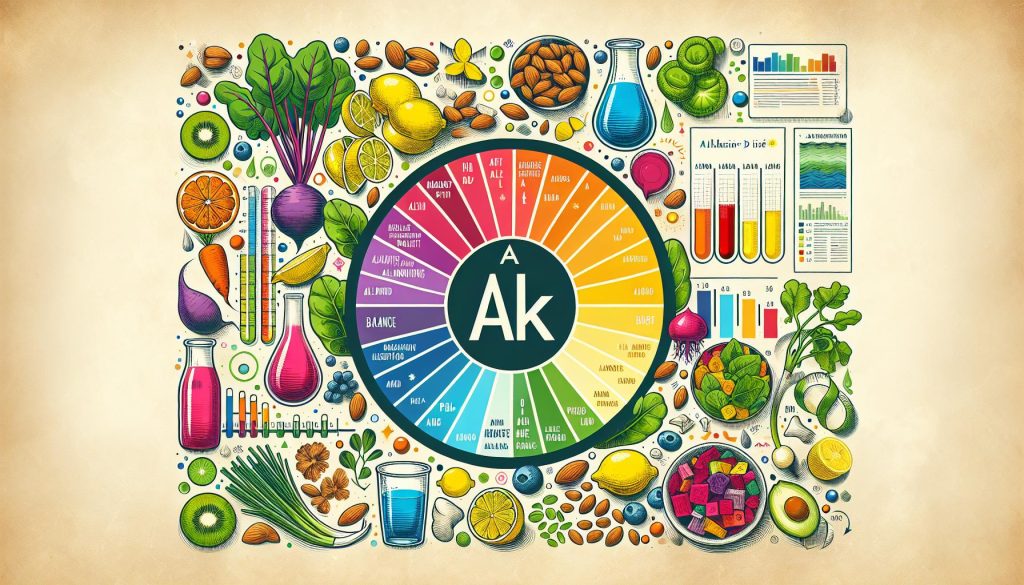
Unraveling the Alkaline Diet: A Comprehensive Introduction
If you’ve ever wondered, “What does the alkaline diet consist of?” you’ve come to the right place. Simply put, the alkaline diet is a dietary pattern that strives to tip the scale in favor of alkaline-forming foods, all for the sake of maintaining the body’s natural pH balance. In this enlightening exposition, we’ll dive into the heart of the matter, providing more details about its components, the underlying principles, potential benefits, and debatable drawbacks of this diet. Whisking you on a whirlwind tour of this eating approach, we’re set to explore the rich repository of foods that make up this diet, before heading onto the all-important ‘how-to’ guidelines.
Alkaline Diet Demystified: Foods and Principles
By its very nature, the alkaline diet places a premium on fresh fruits, vegetables, nuts, and legumes, while seeking to reduce the intake of processed foods, dairy, meat, and high-sodium foods. As the name suggests, the alkaline diet seeks to tip the scales away from acidity towards alkalinity in our bodies. Think of it as your gastronomic GPS, steering you towards choices that keep the pH pendulum swinging towards the alkaline side.
The Alkalinity Anecdote – Why the Bias?
So why the emphasis on alkaline-forming foods? It’s true, balance is beautiful in most aspects of life, including our diets. However, many of the foods we consume in a ‘standard’ diet – meats, dairy, and processed foods – are acid-forming. The alkaline diet, therefore, is less about demonizing acidity and more about helping us hit the dietary sweet spot of pH balance, by steering us back towards alkaline-forming foods.
Potential Perks and Possible Pitfalls of the Alkaline Diet
This diet comes with a host of potential benefits, ranging from increased energy levels, improved skin health, better digestion, weight management, and even the potential reduction of chronic disease risks. However, it’s not all sunshine and rainbows. The alkaline diet has received its fair share of criticism and skepticism, with concerns raised over the restrictive nature of the diet and its potential for nutrient deficiencies, especially in protein, calcium and vitamin B12.
Debating Dietary Restrictions – Drawing the Line
While the alkaline diet promotes the consumption of a plethora of healthful, nutritious foods, it simultaneously discourages or limits others, such as meat, dairy products, and eggs, that provide essential nutrients. It’s important to be cautious when adopting such a restricted diet, and to ensure balanced nutrition through other means or modifications.
Treading the Alkaline Path: A Practical Guide
Implementing the alkaline diet might be as straightforward as increasing your intake of vegetables, fruits, nuts, seeds, and legumes while steering clear of highly processed foods, meats, and dairy. A golden nugget of advice is choosing foods low in sodium and high in potassium, calcium, and magnesium, which are prominent in alkaline-forming diets. Moreover, a sprinkle of alkaline diet wisdom says “stay hydrated!” – water intake is pivotal while adopting this diet.
Brick by Brick – Making the Shift
Adopting a completely new dietary approach might feel like diving off the deep end. But change, like building a brick house, is best undertaken one step at a time. Gradual replacement of acid-forming foods with more alkaline options could be a manageable, realistic way to embark on the alkaline diet journey.
In the Alkaline Afterglow: The Takeaway
In conclusion, the alkaline diet represents a passionate pivot towards a bounty of fruits, vegetables, nuts, and legumes, encouraging followers to embrace natural, unprocessed foods. While there are potential benefits aplenty, it’s vital to tread with caution given the diet’s restrictions and potential for nutritional deficiencies. Wisdom lies in striking the right balance, perhaps tailoring an alkaline-focused diet that also ensures adequate nutrition from a variety of food sources.
Frequently Asked Questions
1. Can anyone follow the alkaline diet? While the principles of the diet are generally healthy – promoting fruits, vegetables, and water, and discouraging processed food – some people, like those with kidney disorders or nutritional deficiencies, should speak with a healthcare professional first.
2. Will the alkaline diet help me lose weight? Possibly, but not because of any inherent “alkalizing” effects. Instead, weight loss on this diet is usually because it promotes filling, low-calorie foods, and discourages high-calorie processed foods and sweets.
3. Can I eat meat on the alkaline diet? The alkaline diet recommends limiting meat intake due to its acidifying effect on the body. However, small amounts may be manageable, especially if balanced with plentiful alkaline-forming foods.
4. Do I need to test my pH when on the alkaline diet? Generally, no. Your body does an excellent job of maintaining pH balance on its own.
5. How can I ensure I get enough protein on the alkaline diet? Nuts, seeds, and legumes are all alkaline-forming protein sources. If these don’t cover your needs, you might need to make some modifications, perhaps including small amounts of acid-forming protein like lean meat, or consider protein powders as an additional supplement.



